THE HINDU – CURRENT NOTE 07 February
 181 Irrawaddy dolphins counted in Odisha census
181 Irrawaddy dolphins counted in Odisha census
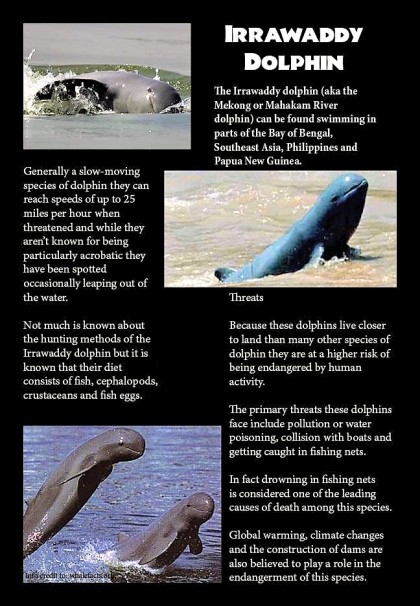
- 181 endangered Irrawaddy dolphins have been sighted in Odisha, according to a census carried out by the State Forest and Environment department on January 20. In 2015, survey teams had sighted 206 Irrawaddy dolphins.
- Humpback dolphins (34), bottlenose dolphins (31) and five pantropical spotted dolphins were also sighted. This marks a significant drop from 2015, when survey teams recorded 450 dolphins.
- The Chilika Lake, the largest brackish water lagoon of the country, has recorded a marginal drop in the population of Irrawaddy dolphins from 144 in 2015 to 134 this year. About 55 dolphins were sighted this year in Bhitarakanika, compared to 58 spotted in 2015. In the Bhadrak Wildlife Sanctuary jurisdiction, only five Irrawady dolphins were sighted.
- Sighting of dolphins depended on the weather condition of the day the census was carried out. Migration of dolphins continuously takes place in waters close to the coast. While endangered Irrawaddies are found in three places, humpback and bottlenose dolphins are not distributed uniformly in the State
- The dolphin census in Odisha in 2016 was suspended because of lack of visibility due to cloudy weather, high wind speed and surging waves but researchers, government officials and wildlife enthusiasts took up the survey again this year.
 Not a drop of the Ganga has been cleaned: NGT
Not a drop of the Ganga has been cleaned: NGT
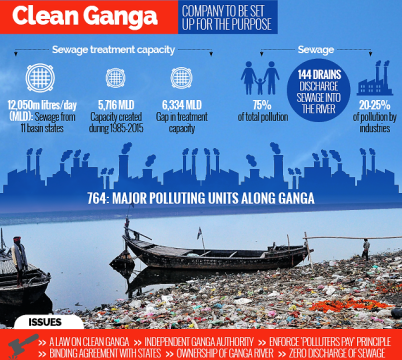
- The National Green Tribunal (NGT) noting that government agencies were only wasting public money in the name of cleaning the river, said Not a single drop of the Ganga has been cleaned so far.
- A Bench headed by NGT chairperson Justice Swatanter Kumar asked government agencies to work together for the cause, saying, “The Prime Minister has given you a goal, take it as a national project.” It is the fault of the CPCB (Central Pollution Control Board) and other government agencies, who are not doing their job properly.”
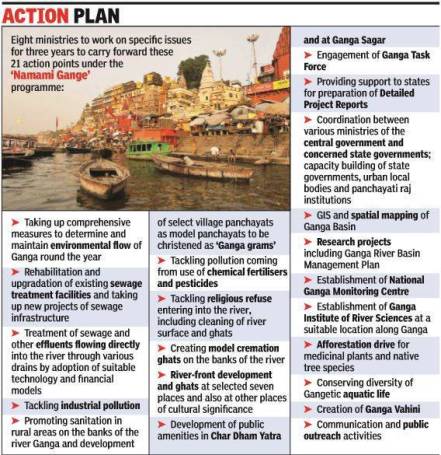
- The tribunal also asked the government agencies about how they were executing Prime Minister Narendra Modi’s ambitious Namami Gange project, adding that it did not want the “drama” regarding complaints between the Centre and Uttar Pradesh to go on.
- The Central government has allotted over 2,000 crore under the ‘Namami Gange’ programme for the purpose of cleaning the Ganga.
- The tribunal also warned 14 industrial units operating in the Bijnor and Amroha districts, along the banks of the Ganga, to be ready to be shut down while asking them to justify why they should not face action.
 Japan’s mission to clean up ‘space junk’ misses the mark
Japan’s mission to clean up ‘space junk’ misses the mark
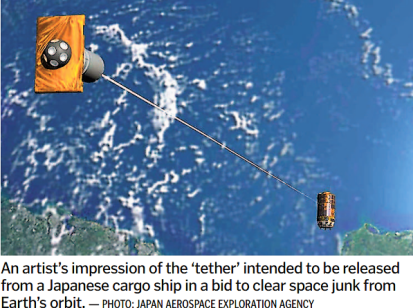
Over 100 million pieces of garbage are thought to be whizzing around the planet, including cast-off equipment from old satellites and bits of rocket, which experts say could pose risks for future space exploration.
The Tether cleaner:
- Scientists at the Japan Aerospace Exploration Agency (JAXA) were trying to test an electrodynamic ‘tether’— created with the help of a fishing net company — to slow down the orbiting rubbish and bring it into a lower orbit.
- The hope was that the clutter, built up after more than five decades of human space exploration, would eventually enter the Earth’s atmosphere and burn up harmlessly before it had a chance to crash into the planet.
- The 700-metre-long tether was made from thin wires of stainless steel and aluminium. It was due to be extended out from a cargo ship launched in December carrying supplies for astronauts at the International Space Station.
The Problems & Missions:
- An experimental Japanese mission to clear ‘space junk’ or rubbish from the Earth’s orbit has ended in failure as the tether did not get released.
- Earlier the agency had to abort a mission that sought to use a mini-rocket to send a satellite into orbit.
- The agency also abandoned a pricey ultra-high-tech satellite launched in February last year to search for X-rays emanating from black holes and galaxy clusters after losing contact with the spacecraft.
 Ministries, sectoral regulators to screen FDI proposals
Ministries, sectoral regulators to screen FDI proposals
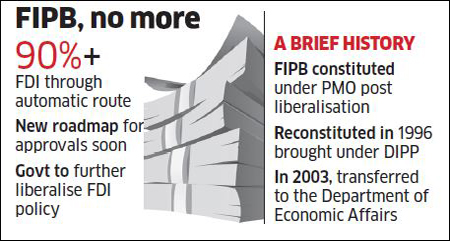
- The Centre in Budget 2017-18, proposed that Foreign Investment Promotion Board (FIPB) — which offered a single window clearance mechanism for FDI applications in sectors under the approval route – will be abolished in FY’18 keeping in line with the government’s policy of maximum governance and minimum government.
- The applications — on foreign direct investment (FDI) in India in sectors under the approval route inter-ministerial Foreign Investment Promotion Board (FIPB) will soon be taken up by the concerned ministries and sectoral regulators.
- More than 92% of the FDI inflows were through the automatic route for remaining FDI (about 8% of the total FDI inflows), every department concerned has a framework or a regulator for it.
Policy for Sector:
- The government’s policy decision is taken on the matter will be applicable to the entire sector and not just one company.
- Earlier a high-level panel — including officials from the Departments of Industrial Policy and Promotion, Commerce and Revenue — had heard out Apple’s demands including tax and duty concessions to help it go ahead with its ‘Make In India’ plans.
- There were more than 40 companies manufacturing mobile phones in the country, none of them had sought similar concessions – including easing labelling and local sourcing norms – for starting manufacturing in the country and therefore the government will not be able to relax rules only for Apple.
 Implement WTO’s Nairobi Ministerial decisions: India
Implement WTO’s Nairobi Ministerial decisions: India
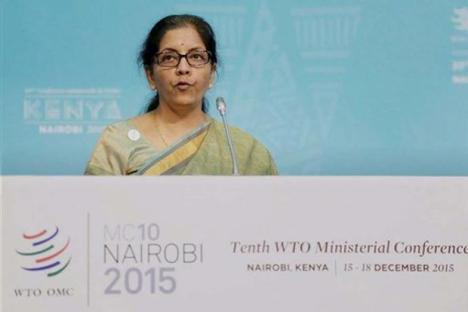
India soon take up with World Trade Organisation (WTO) Director General Roberto Azevêdo the need to ensure that processes on outstanding issues — including on food security — of the WTO’s Doha Round negotiations are completed before the December 2017 Ministerial Conference (MC) in Argentina.
India’s Views:
- India was very clear on its stand that ‘new issues’ including e-commerce and investment cannot be brought into the formal agenda of the WTO-level negotiations on liberalisation of global trade without consensus among all the WTO members.
- In view of the reluctance of developed countries to agree to continue the Doha Development Agenda post-Nairobi, India negotiated and secured a re-affirmative Ministerial Decision on public stockholding for food security purposes honouring both the Bali Ministerial and (WTO) General Council Decisions. The decision commits (WTO) members to engage constructively in finding a permanent solution to this issue [of public stockholding for food security purposes].
- The Ministerial Conference is the WTO’s highest decision-making body, usually happens every two years. Next meeting will be held in Argentina in December,2017.
 Rohingya refugees to be relocated on remote island
Rohingya refugees to be relocated on remote island
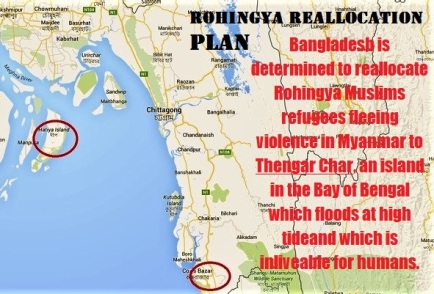
- Bangladeshi authorities have decided to relocate thousands of refugees from Myanmar to a thinly populated island in the Bay of Bengal to avoid adverse socioeconomic impacts in the mainland.
- Bangladeshi Foreign Minister A.H. Mahmud Ali Officially disclose the plan for the first time among diplomatic community including top officials from the UN agencies asking for the international support to provide assistance in developing the island and in transporting the refugees to the new place.
Current Conditions:
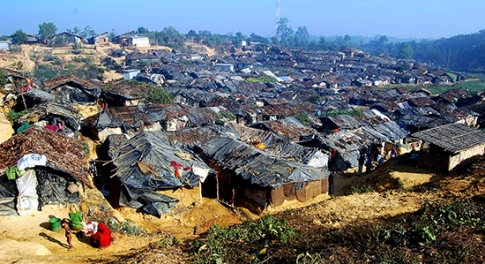
- Rohingyas are currently living in different camps in Cox’s Bazar including Nayapara, Leda and Kutupalang — apart from other parts of the country.
- The Rohingya refugees, including those who have moved in from Myanmar in the recent months, would be relocated from the Cox’s Bazar district to Thengar Char, an island in the Bay of Bengal about 30,000 hectares in area and more than 37 miles from the mainland.
- Over 4,00,000 Myanmar nationals, including the 69,000 people who recently arrived, are now living in Cox’s Bazar after fleeing military persecution in Myanmar’s Rakhine State.
- The relocation would be a temporary arrangement, Bangladesh has requested the international community to take “meaningful measures” for repatriation of the refugee population to Myanmar.
 China’s new ballistic missile has India in range
China’s new ballistic missile has India in range
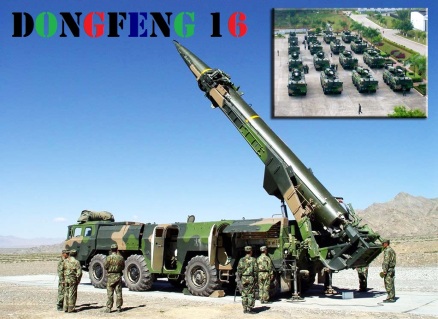
- China’s newly-formed Rocket Force has conducted an exercise with advanced DF-16 medium-range ballistic missile that has a range of over 1,000 km and could target a number countries in the neighbourhood, including India.
- First displayed at a military parade in Beijing in 2015, the missile is believed to have a range of 1,000 km, putting it within striking distance of Okinawa, home to several U.S. military installations in Japan, Taiwan and the Philippines. Several 10-wheeled mobile launch vehicles carrying the ballistic missiles were seen in the footage.
- People’s Liberation Army (PLA) has released a video of the recent exercise of its troops employing the advanced Dongfeng-16 medium-range ballistic missile. The Rocket Force is a special contingent to handle range of missiles in its military’s arsenal.
About Dongfeng Missile:
- DF-16 is a new-model missile of Dongfeng Series. Its a medium range(1,000–1,600 km) ballestic missile(MRBM). It can carries 1,000–1,500 kg of Warhead with 5-10 meter accuracy to hit.
- It have bi-conic warhead structure with specialized terminally guide and deep penetrating warhead module.
- It uses a new protective “shell” to cover the missile and can be launched from a 10×10 wheeled TEL.
 In Lutyens’ Delhi, Dalhousie Road becomes Dara Shikoh Road
In Lutyens’ Delhi, Dalhousie Road becomes Dara Shikoh Road
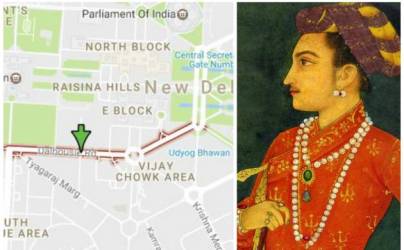
- The New Delhi Municipal Council passed a proposal to change the name of Dalhousie Road to Dara Shikoh Road, making it the third Lutyens’ Delhi road to be renamed in about a year-and-a-half.
- Lord Dalhousie, the Governor-General of British India in the mid 19th Century, annexed large parts of the country, including Awadh.
- Dara Shikoh was the eldest son of Mughal emperor Shah Jahan.
- The Council decided to honour Dara Shikoh for “bringing Hindus and Muslims together”.
- As per rules of the Centre, only names given to public facilities pre-Independence can be changed, so the colonial- era Dalhousie Road could be renamed.
- This is the third time that the NDMC has renamed a road in less than two years.
- In August 2015, Aurangzeb Road became Dr. A.P.J. Abdul Kalam Road.
- Then, in September 2016, Race Course Road, where the Prime Minister’s residence is located, was renamed Lok Kalyan Marg.
 Missing IS backers active on social media: NIA
Missing IS backers active on social media: NIA
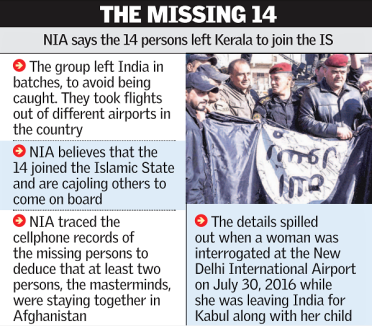
The National Investigation Agency (NIA) has furnished details of the exit of 14 persons from Kerala, who are suspected to have joined the Islamic State in Afghanistan. The group, reported missing last year, includes infants and children.
Well-planned conspiracy:
- It was a well-thought-out conspiracy to leave India on different travel dates to avoid being caught.
- Abdul Rashid, a resident of Kasaragod district was the mastermind of the entire episode and that he brainwashed Yasmeen to divorce her husband and fly to the IS-controlled territory.
- Rashid took classes on Islamic studies at Al-Quma Arabic college at Colombo in Sri Lanka. He, along with like-minded associates, were prematurely expelled from the college, for advocating
- The missing persons have left India and joined the terrorist organisation IS in the Nangarhar province of Afghanistan. The accused are continuing their anti-national activities by propagating the ideology of and inviting support for IS, through various means including, but not limited to, Internet-based social media platforms.
- Wilayat Khorasan of Islamic State in Afghanistan came into existence in 2015 after fall off from Tehrik-i-Taliban Pakistan (TTP).
 Rewiring the WTO
Rewiring the WTO
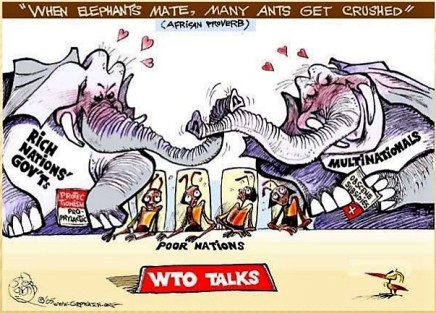
- The Trans-Pacific Partnership (TPP) — which had almost become the standard bearer of trade rules faced and end after Trum letting out U.S of the Pact.
- United States orchestrated the move to make the WTO virtually irrelevant during the 10th Ministerial Conference of the organisation, in Nairobi in 2015 which ended without a decision on the most important area of work of WTO members — the Doha Round negotiations.
No Scope for Developing Economies:
- During Doha ministerial conference in 2001 negotiations were made to review extant trade rules in order to make the WTO more responsive to the needs of the majority of its membership — the developing countries.
- The developing world has largely been questioning the relevance of the WTO for some years now, when the richer nations gained the upper hand in setting the priorities for the organisation. The efforts of the developing countries to amend several important agreements and to make them more responsive to their development needs have been seriously undermined.
- Matter critically worsen for least developed countries especially their inability to increase their presence in the global markets, have also been put on the backburner.
Silence on food Stockholding:
- The skewed rules in the areas of agriculture and intellectual property rights have been flagged by the developing countries as their particular areas of concern. In agriculture, WTO rules have been loaded in favour of the developed countries, while the interests of small farmers have almost been completely ignored.
India’s Point of View:
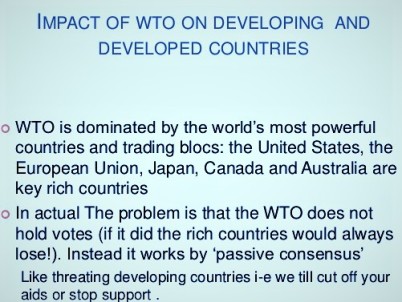
- India flagged the important issue of food security and argued that the sovereign states must have the right to decide the manner in which the poor should be provided subsidised food.
- This issue arose after questions were raised as to whether public stockholding of food, which is at the heart of India’s Public Distribution System (PDS), meets the WTO disciplines on agricultural subsidies.
- After India countered the viewpoints of the countries questioning its PDS, an understanding was reached where even if India breached agricultural subsidies’ disciplines to meet its food security needs, no penal action would be taken against it through what is commonly called a “peace clause”.
- India’s insistence that there should be a permanent solution to the problem of public stockholding for food security purposes has been met with deafening silence.
No clause for Developing Nations:
- Trade facilitation was not exactly an area that excited the developing countries for their shares in global trade are at very low levels. Moreover, by accepting the commitments under the agreement, they were required to undertake changes in their customs procedures and facilities, which seemed a daunting task for many of the poorer countries.
- The critical element was the availability of financing facilities for undertaking the modifications. However, despite their initial opposition, the developing countries eventually accepted the Agreement on Trade Facilitation at the end of the Bali Ministerial Conference in 2013.
Ground making for 11th Conference with e-commerce an agenda:
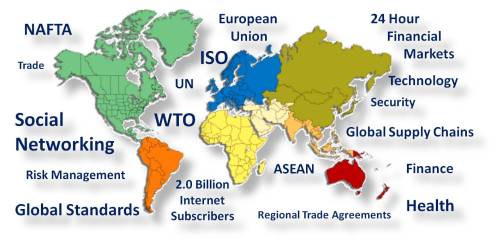
- New issues that have been identified for inclusion in the WTO are electronic commerce and investment. Their inclusion has been supported by the International Chamber of Commerce (ICC) and the B-20 (Business 20, representing the business groups of G-20 countries).
- The ICC and B-20 tabled a proposal in September 2016 for the adoption of a “WTO package” on e-commerce. Interestingly, this proposal speaks of promoting micro, small and medium enterprises (MSMEs) through the better adoption of e-commerce.
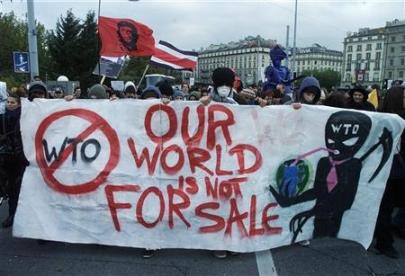
- The proposal argues that an effective e-commerce environment would level the playing field between large and small businesses, thus enabling the latter to overcome the hurdles in accessing markets.
- The ICC-B-20 have proposed that the “package” should also provide capacity building resources to the developing economies, “including targeted assistance to ensure that MSMEs can get online and expand their business through e-commerce”.
- This approach is similar to the Trade Facilitation Agreement Facility, the window for supporting developing and least-developed countries to implement the Trade Facilitation Agreement.
- In 2015, Internet penetration in the least-developed and low income countries was 12.6% and 9.4%, respectively. Even for the low middle income countries, the figure was below the global average. These disparities in Internet penetration should make it clear as to who would be the likely beneficiaries from e-commerce.
Divisive issue of investment:
- The issue of including investment in the WTO has been a deeply divisive, previous attempts to include an investment agreement have been met with much resistance from the developing countries, the latest bid comes at a time when the investor-friendly bilateral investment treaties (BITs) are under the scanner.
- The focus is on the investor state dispute settlement process, using which investors can sue their host states in private international panels.
India’s View:
- India has unilaterally revoked a majority of the 73 BITs that it was a party to and has adopted a new model BIT that would be the basis of its future BITs. The new model BIT vastly truncated the powers of the foreign investor and their right to initiate disputes.
The inclusion of e-commerce and investment in the WTO would further drive the wedge between the rich and the poor nations. The growing disenchantment with the existing model of globalisation has provided a historic opportunity to frame new rules that give equal opportunities to all countries and their citizens in the global marketplace.
 Saab pitches to supply naval fighter
Saab pitches to supply naval fighter
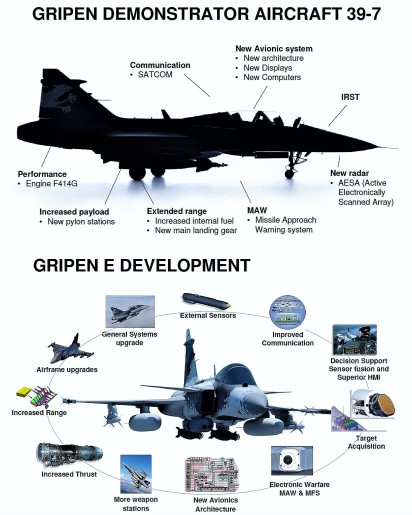
- Swedish defence major Saab will be competing to supply the Gripen M (Maritime) version of the Sea Gripen aircraft to the Indian Navy and has expressed interest in procurement by the Navy, which had put out a Request for Information (RFI) last month.
- The Navy is looking for a carrier-based multi-role fighter aircraft after the naval variant of the indigenous Light Combat Aircraft did not meet its requirements. It is looking to procure 57 such aircraft.
- Saab had fielded a Gripen model when India was looking for a Medium Multi-Role Combat Aircraft . The naval version of Gripen is already designed for short take-off and landing and also has several important features integrated,
- Saab is also competing with Lockheed Martin F-16 to supply the Gripen E variant to the Indian Air Force. The Indian government finally settled for 36 Dassault Rafale aircraft in a government-to-government deal instead of the 126 aircraft decided earlier.
